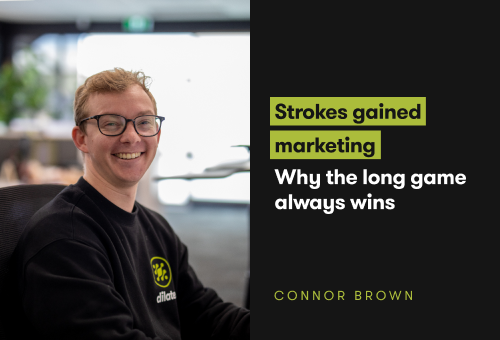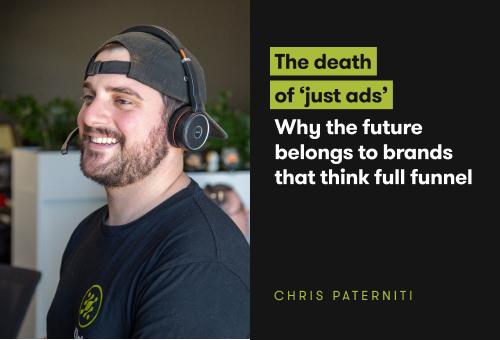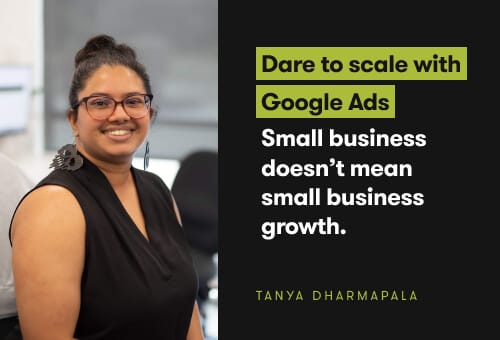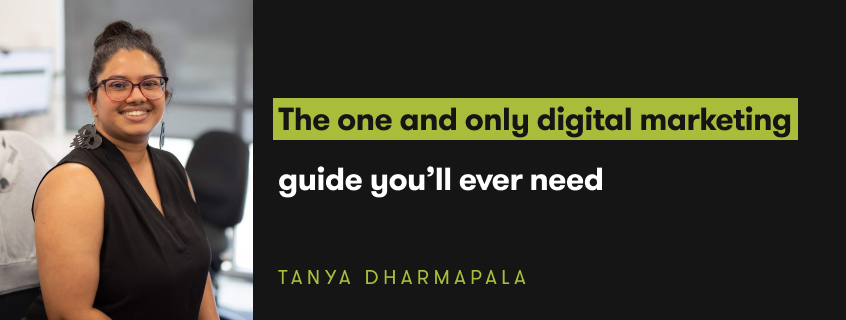
The one and only digital marketing guide you’ll ever need
Digital marketing is a must-do for businesses. That is, if you’re looking to grow your business. Good news is, if you’re familiar with traditional marketing – like TV ads and billboards – you’re already on the right track.
However, those old methods can’t compete with the precision and flexibility of digital marketing. It can transform how businesses connect with customers by using data to create highly personalised campaigns.
So picture this: reaching potential customers with tailored ads while they’re scrolling through social media or searching online. Digital marketing does just that, using the internet to create engaging, instant, and measurable connections with the right people, your ideal customers. So, buckle up and read on for everything digital marketing explained.
So, what is digital marketing?
Digital marketing is essentially traditional marketing, but it happens online. Duh, I know, But it’s also more powerful. Businesses use digital channels like websites, social media, and email to promote products, build relationships, and increase sales. The goal remains the same: understand your customers, build trust, and guide them to a sale. The difference is in how strategic you get to be.
Digital marketing is about more than just putting your message out there. It's about creating meaningful connections with your audience. You collect information about your customers, and then you analyse this information to improve your strategies, before interacting with them online and sharing valuable content that interests them.
What makes up ‘digital marketing?’
Channels: Use platforms like social media, search engines, email, and your website to reach customers. Each platform serves a different purpose.
Your website is your online presence. Social media helps you build brand recognition and connect with your audience through posts and discussions. Search engines let you reach interested customers by improving your website's ranking (SEO) and using paid ads. Email marketing helps you develop relationships with potential customers and maintain contact with current ones. And so on.
Targeting: All that demographic data you’ve gathered? Now you can accurately target based on factors like age, interests, and online activity with pinpoint accuracy This helps you spend your advertising money wisely. Instead of a general approach, tailor your messages to particular audiences. Which means more effective campaigns and way better results.
Measurement: Track your campaign performance and make changes in REAL-TIME! Monitor everything from website traffic to sales to get seriously powerful insights. Use tools like Google Analytics to understand how people engage with your brand. Make informed decisions, improve your strategies, and maximise your return on investment (ROI).
What are the benefits of digital marketing?
Digital marketing beats traditional marketing hands down when it comes to reaching people, measuring results, and saving money.
Better reach
Multi-channel presence: Digital marketing allows you to engage with customers across multiple touchpoints. From social media platforms and search engines to email newsletters and online forums, your brand can be omnipresent, meeting customers where they spend their time online.
24/7 availability: Unlike traditional marketing, which often depends on specific time slots (e.g., TV commercials during prime time), digital marketing operates around the clock. Your content is accessible to users at any time, providing constant engagement and opportunities for conversions.
Targeted reach: Digital marketing tools allow for precise audience targeting based on demographics, interests, behaviours, and more. This ensures that your marketing efforts reach the right people, increasing the likelihood of engagement and conversions.
Trackable results
Digital marketing gives you superpowers when it comes to measuring success. Unlike traditional marketing, where it's hard to know what's working, digital marketing gives you a crystal-clear view of your campaigns.
Analytics tools: Tools like Google Analytics and Facebook Insights are like magic wands, showing you exactly how people behave on your website and social media. You can see who's visiting, what they're interested in, and even if they buy something.
Real-time monitoring: Imagine watching your marketing campaigns in action! With digital marketing, you can see what's happening as it happens. This means you can quickly change things if something isn't working.
Attribution models: Digital marketing offers various attribution models to understand which channels and touchpoints contribute to conversions. This helps you allocate your budget more effectively and identify the most impactful strategies.
Campaign insights: Detailed reports and dashboards provide insights into audience demographics, interests, and behaviours. This data-driven approach helps refine your marketing strategies, ensuring that future campaigns are more effective and targeted.
Cost efficiency
Instead of spending a fortune on TV ads or billboards and hoping the right people see them, you can focus your money where you know it’s working.
Lower entry costs: Getting started with digital marketing is usually cheaper than traditional methods. This means even small businesses can compete with the big businesses.
Budget control: Digital marketing allows for precise budget control. You can set daily or lifetime budgets for campaigns, ensuring you don’t overspend. Additionally, you can pause or adjust campaigns in real-time based on performance, optimising your spend for maximum ROI.
Higher ROI: Digital marketing's targeted nature and real-time optimisation capabilities often result in higher ROI compared to traditional marketing. By reaching the right audience with the right message at the right time, you can achieve better conversion rates and maximise your marketing budget.
Less waste: With traditional marketing, you often end up showing ads to people who aren't interested. Digital marketing helps you avoid this by showing your ads to the right people at the right time.
So, does it matter whether I’m B2B or B2C?
Digital marketing is a versatile tool, but its application differs significantly between businesses selling to other businesses (B2B) and those selling directly to consumers (B2C).
Understanding the differences
B2B and B2C customers have distinct needs and buying behaviours. This influences how you approach your digital marketing strategy.
- Decision-making process: B2B customers often involve multiple stakeholders and have longer sales cycles. Relationship-building is crucial. B2C customers typically make quicker decisions based on emotional connections and product benefits.
- Purchase motivation: B2B buyers are driven by logic and ROI, requiring data-driven content and case studies. B2C customers are more influenced by emotions, storytelling, and lifestyle imagery.
- Customer interaction: B2B marketing often involves personalised interactions and lead nurturing. B2C focuses on broader audience targeting and shorter sales cycles.
Adapting your strategy
While these are general trends, it's essential to tailor your approach to your specific audience. A luxury car brand, for instance, might employ both B2B and B2C strategies.
To create effective digital marketing campaigns, deeply understand your target audience. By tailoring your messaging, content, and channels, you can maximise your impact and achieve your business goals.
Exploring the different channels
Digital marketing offers a toolbox of platforms, each with its own strengths. To build a winning strategy, you need to understand how these tools work together and how they fit into your customer's journey.
Social media marketing
Social media sites like Facebook, Instagram, Twitter, LinkedIn, and Pinterest are great places to connect with your audience. Each platform is popular with different kinds of people, so it's important to pick the right ones for your customers.
Search engine marketing (SEM)
Search engines like Google and Bing are where people go to find things. SEM helps you show up when people search for what you offer.
SEO (Search engine optimisation): This is about making your website and content rank higher in search results. Find the right keywords, optimise your website, create great content, and build links to your site. The goal is to get people to find you naturally.
PPC (Pay-per-click) advertising: This lets you bid on keywords to show ads when people search for specific things. Google Ads is the most popular way to do this. You can create targeted ads that appear when people search for what you offer. PPC is great for getting quick results, especially for competitive keywords.
Email marketing

Email is a powerful way to build relationships with customers and keep them coming back. Send targeted emails to your subscribers to promote products, share news, or provide helpful information.
Newsletters: Send regular emails with updates, industry news, and valuable content. Keep your brand top-of-mind and stay connected with your audience.
Promotional emails: Create special email campaigns to boost sales or conversions. Offer discounts, new products, or exclusive events.
Automated emails: Set up emails that go out automatically based on what people do. Welcome new subscribers, remind people about abandoned carts, or follow up after a purchase.
Content marketing

Create and share valuable content to attract and engage your audience. This includes blog posts, videos, infographics, podcasts, and more.
Blogging: Write informative and interesting blog posts to improve your SEO, establish your authority, and attract people to your website. Write about things your audience cares about.
Video marketing: Videos are engaging and easy to share, so use them on social media and your website. Create tutorials, product demos, or customer stories.
Infographics: Use visuals to explain complex information in a simple way. Share them on social media to drive traffic to your website.
Podcasts: Create audio content that people can listen to on the go. Build a loyal audience and position yourself as an expert in your industry.
Display advertising
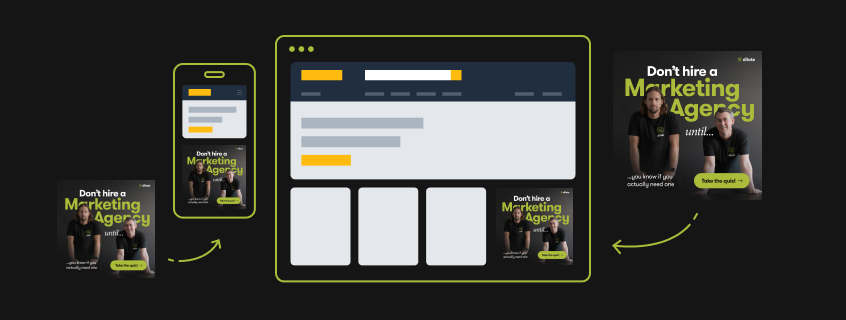
Show your ads on websites, apps, and social media. Use images, videos, or text to grab people's attention.
Banner ads: These are the traditional ads you see on websites. Target them to specific people based on their interests and behaviour.
Video ads: Short videos that play before, during, or after other videos. They're engaging and can tell a story quickly.
Native ads: Ads that look like part of the website or app. They're less intrusive and can get more clicks.
How to get started?
New to the world of digital marketing? No worries! Here are some steps to get you started. And remember, try different things, see what works, and adjust your plan based on the results.
- Define your goals: Decide what you want to achieve with your marketing. Are you trying to get more people to know about your brand, attract new customers, or boost sales? Clear goals will guide your entire strategy.
- Know your audience: Understand your ideal customer inside and out. Who are they? What do they like? What problems do they have? Consider their demographics, interests, behaviours, and their journey from discovering your brand to making a purchase. Create detailed profiles to help you connect with them better.
- Pick the right platforms: Choose the online spots where your target audience hangs out. If you're aiming for young professionals, LinkedIn and Instagram might be better than Twitter or Pinterest.
- Create great content: Develop a plan to share valuable stuff that your audience will love. This could be blog posts, videos, or social media updates.
- Optimise your website: Make sure your website looks good, is easy to navigate, and works well on phones. Use SEO to help people find you through search engines.
- Launch and learn: Start your campaigns and watch how they perform. Pay attention to things like website traffic, how many people buy, and how people interact with your content.
- Keep improving: Use what you learn to make your marketing even better. Test new ideas, measure results, and make changes based on what works.
Our favourite tools that will boost your digital marketing
Digital marketing can be overwhelming, with countless tasks and strategies to manage. That's where the right tools come in. These software solutions can streamline your workflow, save you time, and help you achieve better results.
Finding your audience and boosting your website
Understanding your audience and optimising your website are crucial for digital success. These tools can help you get a clearer picture of your customers and improve your online presence.
- Keyword Research and SEO Tools:
- Semrush: A comprehensive platform for keyword research, competitor analysis, and SEO audits.
- Moz: Offers tools for link building, website analysis, and keyword research.
- Keywords Everywhere: Provides keyword data directly on search engine results pages.
- Google Ads Keyword Planner: Discover new keyword ideas, get search volume estimates, and bid insights.
- Semrush: A comprehensive platform for keyword research, competitor analysis, and SEO audits.
- Website Analysis and Troubleshooting:
- Web Developer: Inspect website elements and performance.
- SEO 1 Click / SEO Minion: Perform quick SEO checks.
- FatRank: Track keyword rankings.
- Detailed SEO Extension: Conduct in-depth SEO analysis.
- Koala Inspector: Analyse Shopify website performance and identify issues.
- Web Developer: Inspect website elements and performance.

Designing and creating engaging content
Visual appeal and user experience are key to capturing your audience's attention. These tools can help you create stunning designs and organise your creative process.
- Figma: Design websites, apps, and other visual content.
- Relume: Find inspiration and create colour palettes.
- Canva: Create social media graphics, presentations, and other visual content.
- Shutterstock: Source high-quality images and videos for your projects.
- Adobe Premiere Pro: Edit and produce professional-quality videos.
Tracking and measuring success
Data is the lifeblood of digital marketing. These tools provide insights into your campaigns' performance, helping you make informed decisions.
- Analytics Tools:
- Google Analytics: How your website is performing
- Search Console: How you perform on SERPs
- Hotjar: Site experience
- Lighthouse: Audit website technical performance, speed, accessibility, and SEO.
- Google Analytics: How your website is performing
Moving forward with digital marketing
Digital marketing is a powerful tool that can help your business grow. It's a smart, efficient way to connect with customers. By planning carefully and understanding the basics, you can create successful campaigns that drive results.
Want to dive deeper into specific digital marketing strategies? Check out our blogs on social media, search engine optimisation (SEO), and email marketing. These areas can help you unlock the full potential of digital marketing for your business. Whether you're a marketing pro or just starting out, digital marketing can help you succeed in today's digital world.


